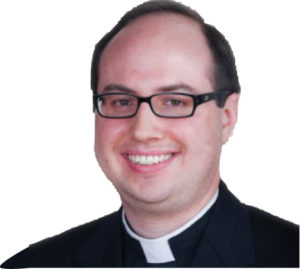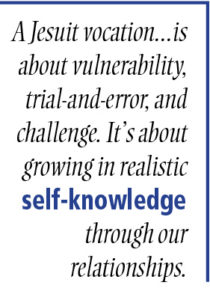By Father Sean Salai, SJ
For Today’s Catholic
 The most important lesson I’ve learned in my Jesuit vocation came from an 80-year old Jesuit named Hilton Rivet. Father Hilton, who is now with God, had a glass eye and a bit of a mouth on him when I met him while working in campus ministry as a novice at Loyola University New Orleans 10 years ago. Since Hilton was semi-retired and I was a novice, we both had lots of free time to sit on the porch or in the TV room at the St. Charles Jesuit house.
The most important lesson I’ve learned in my Jesuit vocation came from an 80-year old Jesuit named Hilton Rivet. Father Hilton, who is now with God, had a glass eye and a bit of a mouth on him when I met him while working in campus ministry as a novice at Loyola University New Orleans 10 years ago. Since Hilton was semi-retired and I was a novice, we both had lots of free time to sit on the porch or in the TV room at the St. Charles Jesuit house.
One lazy Saturday afternoon, I was sitting with him in the TV room watching a golf game, not quite sure if he was awake or napping because of his glass eye. Suddenly, as I was starting to get bored and think about doing something else, Hilton spoke to me from his easy chair: “Carissime, was Tiger Woods wearing a different color hat just a second ago?” Of course, I had no idea, but I started to give him different theories about the match being recorded and Tiger Woods switching hats. Irritated, Hilton interrupted me and held up a finger. He said: “Let me give you a piece of advice: It’s okay to say ‘I don’t know.’ Don’t be one of those smart-aleck Jesuits who has an answer to everything even when he doesn’t.” Then Hilton leaned back, closed his good eye, and started snoring.
That moment with Hilton has stayed with me throughout my 12 years of formation prior to my priesthood ordination last June 10 at Loyola. And one thing I’ve learned, over and over again, is that it’s okay not to have all the answers. It’s okay to make mistakes and learn from them. For me, a Jesuit vocation is not an either-or choice between doing something perfectly or not doing it at all; it’s not about convincing the Society to let us only do the things we like, or about maintaining the youthful illusion that we can do everything. A Jesuit vocation, as Hilton Rivet showed me, is about vulnerability, trial-and-error, and challenge. It’s about growing in realistic self-knowledge through our relationships.
Three figures in my prayer who embody these qualities are Jesus, St. Paul, and St. Ignatius. In the vulnerability of Jesus, who died on the cross as a failure in the eyes of the world, we see what Jesuit author John Navone calls a “theology of failure.” A favorite theologian of Pope Francis, who has experienced failure in his own Jesuit life, Father Navone says: “Humanly speaking, Jesus had miserably failed to convert his beloved people. He died a total reject. It is only in the light of Christian faith in his resurrection that what failed by human standards succeeded before God. The Risen Christ is the answer of God to human failure” (America interview, 6/15/16).
St. Paul, whose life changed after encountering the Risen Christ, exemplifies what it means to find God through a process of trial-and-error. Although Paul isn’t personally my favorite saint, his writings seem to keep coming up on my retreats, and I appreciate his comparison of his own weakness to the salvation of Jesus. In his second letter to the Corinthians, St. Paul says: “If I must boast, I will boast of the things that show my weakness” (2 Cor 11:30). After the Road to Damascus, Paul was not a timid man who gave up if he couldn’t do something perfectly the first time, but a realistic evangelist who learned from his own flaws. In a self-help book I recently read, Texas-based author Brene Brown said many Americans today seem to think we’re either naturally gifted or naturally awful at everything, meaning we should just give up if we can’t immediately be the best at something. But St. Paul embodies the more psychologically healthy attitude that talent requires years of hard work, as no athlete “finishes the race” without many years of toil and hardship.
 As a missionary at heart, St. Ignatius had a lot in common with St. Paul, even though he never traveled as far. Like St. Paul on the road to Damascus, Ignatius learned from the failure of Pamplona and respond to God’s call in his life, embracing new challenges rather than clinging to what was comfortable. Although he dreamed of evangelizing the East, he accepted a desk job in Rome, renouncing his desire for the good of the community. While I’m sure other saints have done greater things in the eyes of the world, I don’t believe anyone has ever felt God’s love and the desire to share it with others at any cost quite as intensely as Ignatius. On my ordination retreat in Grand Coteau, I rediscovered a passage from Ribadeneira’s “Life of Ignatius of Loyola” that has stayed with me since I first read it as a novice. Describing the mystical contemplations of Ignatius, Ribadeneira says Father Diego Lainez used to observe him going up to the roof of our house in Rome to gaze at the stars. Ribadeneira writes: “He would go up onto the terrace, where he liked to look up at the sky. He would stand there for a little while, stock-still, his eyes fixed on the heavens. Then he would worship God on bent knee. Next, uncovering his head, he would sit on a low bench, on account of his physical frailty. Right away streams of tears would gush forth. This happened gently and calmly, and without any sobbing or noise or bodily movement” (#512/15).
As a missionary at heart, St. Ignatius had a lot in common with St. Paul, even though he never traveled as far. Like St. Paul on the road to Damascus, Ignatius learned from the failure of Pamplona and respond to God’s call in his life, embracing new challenges rather than clinging to what was comfortable. Although he dreamed of evangelizing the East, he accepted a desk job in Rome, renouncing his desire for the good of the community. While I’m sure other saints have done greater things in the eyes of the world, I don’t believe anyone has ever felt God’s love and the desire to share it with others at any cost quite as intensely as Ignatius. On my ordination retreat in Grand Coteau, I rediscovered a passage from Ribadeneira’s “Life of Ignatius of Loyola” that has stayed with me since I first read it as a novice. Describing the mystical contemplations of Ignatius, Ribadeneira says Father Diego Lainez used to observe him going up to the roof of our house in Rome to gaze at the stars. Ribadeneira writes: “He would go up onto the terrace, where he liked to look up at the sky. He would stand there for a little while, stock-still, his eyes fixed on the heavens. Then he would worship God on bent knee. Next, uncovering his head, he would sit on a low bench, on account of his physical frailty. Right away streams of tears would gush forth. This happened gently and calmly, and without any sobbing or noise or bodily movement” (#512/15).
During my 12 years in the Society, I’ve seen a lot of men in formation who ended up “seeking their perfection elsewhere.” But sometimes I wonder how many of them might have stayed if they had let go of perfection to accept their weaknesses and failures as deeply as Jesus, St. Paul, St. Ignatius, and Hilton Rivet. For myself, I can only say that I have often been wrong, I have often made mistakes, and I have often failed in my life as a Jesuit. And now I’m a priest.
If you’d enjoy an introduction to connecting your faith and everyday life, come join us. Whether you are new to prayer or are looking for new ways to pray and live a more meaningful life, this event is for you. A group of young Jesuit speakers will offer this retreat for young men and women on Feb. 2-3 at Our Lady of Guadalupe Church in San Antonio. A separate ‘Come and See’ Night will take place March 3, at 5 p.m. Men ages 18-45 can RSVP to (sean@jesuits.net) by 7 p.m. on March 2.


